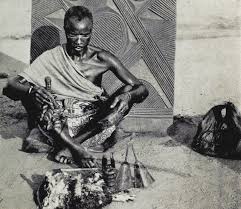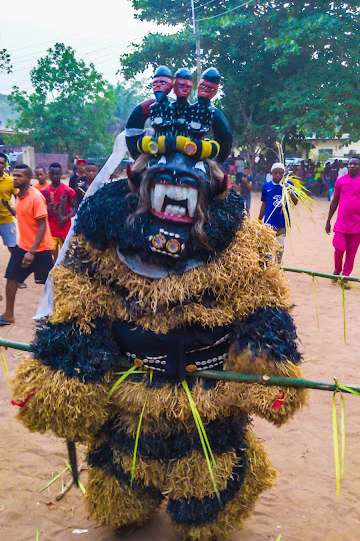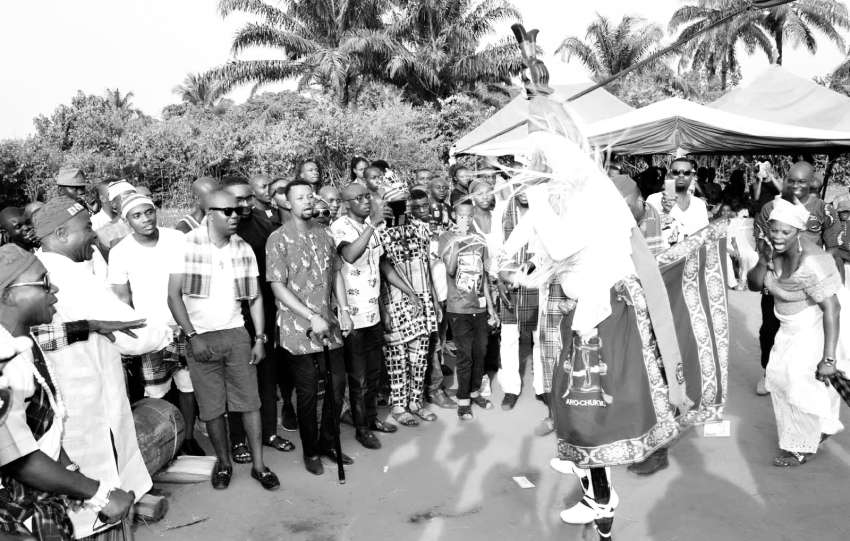
What is Agwu?
Agwu is a divine force in Igbo cosmology, often described as the spirit of revelation and creativity. It is believed to carry messages from Chineke (the Supreme Creator) to humans, embedding each person’s purpose in their heart. Agwu is the universal mind that oversees knowledge, learning, and transformation in all living things, including humans, animals, and spirits. Every being has Agwu, which connects them to their destiny and allows them to tap into infinite wisdom.

In Igbo belief, Agwu is closely tied to chi, a person’s personal spirit or life force. While chi determines one’s path in life, Agwu provides the insight and energy needed to follow it. For example, Agwu guides dibias (traditional priests or healers) in their spiritual work and helps ordinary people excel in their professions, such as farming, trading, or teaching. Agwu is also the source of intuition, enabling individuals to access deep knowledge within their minds.
Agwu and the Role of Dibias
Agwu is especially significant for dibias, who are seen as masters of spiritual wisdom. When Agwu chooses someone to become a dibia, it is often through their maternal or paternal lineage. This calling comes with heightened intuition and a strong connection to the spiritual world, making the chosen person feel like they live in both the physical and spiritual realms.

However, accepting Agwu’s call is not easy. Those chosen often face challenges like illness, financial struggles, or social isolation. These difficulties are Agwu’s way of pushing the individual toward their true purpose. If ignored, these challenges can lead to Ara Agwu, a state of mental distress that resembles conditions like schizophrenia or bipolar disorder. In Igbo culture, such conditions are seen as spiritual rather than purely medical, caused by an untrained mind overwhelmed by Agwu’s messages.

To make peace with Agwu, the chosen person must perform a ceremony called Ịrụ Agwu. This ritual involves building a permanent shrine to Agwu, which is maintained by the family for generations. Unlike a chi shrine, which is destroyed after a person’s death, an Agwu shrine remains as a source of blessings for descendants. Families that honour their Agwu are often rewarded with creative, intelligent children who bring prosperity to the community.
Signs of Agwu’s Presence
Agwu communicates through signs, dreams, and life experiences. In Igbo culture, certain events or symbols indicate that Agwu is calling an individual:
- Dreams and Visions: Seeing animals like tortoises, snails, owls, ibis birds, leopards, squirrels, or dogs in dreams is a common sign of Agwu. For example, a tortoise, which retreats into its shell to find wisdom, represents Agwu’s deep knowledge.
- Recurring Challenges: Frequent misfortune, such as illness, financial loss, or personal tragedies, may indicate that Agwu is urging someone to align with their purpose.
- Hunger as a Metaphor: In Igbo language, hunger is called agụụ, and the phrase agụụ a tala m (Agwu has bitten me) describes the discomfort of hunger. Just as eating relieves hunger, making peace with Agwu resolves spiritual distress.
- Mental and Emotional Struggles: Feelings of sadness, depression, or detachment from the world are often seen as Agwu’s way of redirecting a person toward their destiny.
When these signs appear, Igbo people consult a dibia for Afa divination, a method of decoding spiritual messages using tools like cowries, shells, or seeds. Through Afa, the dibia interprets Agwu’s guidance and advises on the necessary rituals.
Choices for Those Chosen by Agwu
When Agwu selects someone, they have three options:
- Ignore the Call: The person can try to live a normal life, seeking other ways to cope with Agwu’s challenges. However, this often leads to ongoing misfortune or mental distress.
- Reject the Call: Through a ceremony called Ikpe Agwu, the person can ask Agwu to choose someone else in the family. This ritual must be done before adulthood and allows the individual to live free from Agwu’s influence, without consequences.
- Accept the Call: By performing Ịrụ Agwu, the person embraces their role as a dibia or spiritual guide. This unlocks their spiritual gifts, enabling them to serve their community as healers, herbalists, or diviners.
The choice is deeply personal, and Igbo culture respects individual freedom in deciding whether to follow Agwu’s path.
Communicating with Agwu
There are two main ways to connect with Agwu in Igbo spirituality:
- Afa Divination: Afa is a binary system of communication, often using tools like cowries or seeds. The dibia interprets the patterns to deliver clear messages from Agwu. In Igbo belief, Agwu is the spirit of Afa, acting as a link between humans, deities, ancestors, and Chineke. It is like a spiritual internet, connecting different dimensions.
- Meditation: Meditation in Igbo culture is any practice that helps a person access their inner mind. This can include sitting in silence, breathing exercises, walking alone, or even talking to oneself. For example, Igo mmụọ (praying to spirits) or dreaming are forms of meditation. Each person finds their own way to connect with Agwu, based on what works best for them.
These practices allow individuals to receive Agwu’s messages clearly, pulling wisdom from the spiritual world into their lives.
Animal Symbols of Agwu
Agwu is associated with specific animals that reflect its qualities of wisdom, resilience, and creativity. These animals often appear in dreams or rituals to signify Agwu’s presence:
- Tortoise: Represents deep wisdom and patience. In Igbo folklore, the tortoise is a clever trickster, symbolising Agwu’s intelligence. The tortoise shell drum (Ekwe Mbe) is used in ceremonies to invoke Agwu.
- Snail: Symbolises perseverance and gentleness. Like the tortoise, the snail retreats into its shell, reflecting Agwu’s ability to access hidden knowledge.
- Owl: Represents mystery and spiritual insight, often linked to Agwu’s role in divination.
- Ibis Bird: Symbolises knowledge and connection to the spiritual realm.
- Leopard: Embodies strength and courage, reflecting Agwu’s power to guide leaders or warriors.
- Squirrel: Signifies resourcefulness and adaptability.
- Dog: Represents loyalty and protection, often tied to Agwu’s role in guiding traders or families.
These symbols are powerful reminders of Agwu’s influence in Igbo life, appearing in stories, rituals, and dreams.
Agwu in Igbo Society
Agwu plays a vital role in both traditional and modern Igbo society. In traditional settings, Agwu guides dibias in their work as healers, herbalists, midwives, and community leaders. For example, a dibia can read the forest to find medicinal plants or interpret the sky to predict seasons, all through Agwu’s wisdom. Dibias also act as negotiators between humans and spirits, resolving conflicts and restoring balance.
In modern Igbo communities, Agwu remains relevant. Many Igbo professionals, such as doctors, teachers, or entrepreneurs, honour Agwu to ensure success in their work. For instance, an Igbo businessperson might perform rituals to Agwu before starting a new venture, believing it will bring prosperity. Cultural events like masquerade festivals also celebrate Agwu, with performers embodying its spirit to connect with ancestors.
Agwu is often honoured in family shrines called okwu Agwu, where offerings like kola nuts, palm wine, or livestock are made. These shrines are sacred spaces where families seek blessings for wealth, health, and creativity. In Igbo towns like Nri, Awka, and Umunoha, Agwu is central to community rituals, such as the Iri Ji (New Yam Festival), where prayers are offered for abundance.
Agwu and Creativity
Agwu is the source of all creativity in Igbo culture. It inspires the intricate designs of Igbo ulo (mud houses), the colourful patterns of akwete cloth, and the rhythmic beats of ogene music. Artists, musicians, and craftsmen attribute their talents to Agwu, which fuels their ability to create beauty and innovation.
For example, the famous Igbo Uli art, with its flowing lines and symbols, is seen as a gift from Agwu. Similarly, the storytelling tradition, where akuko (folktales) teach moral lessons, draws on Agwu’s wisdom. In modern times, Igbo writers like Chinua Achebe and Chimamanda Ngozi Adichie are celebrated for their creativity, which many attribute to the enduring influence of Agwu.
Challenges and Misunderstandings
Despite its importance, Agwu is sometimes misunderstood, especially in modern contexts. Some associate Agwu only with mental illness or misfortune, overlooking its role as a guide to purpose and creativity. In Igbo belief, the challenges caused by Agwu are not punishments but calls to action, urging individuals to embrace their destiny.
Colonialism and Western religions have also impacted the perception of Agwu. During the colonial era, many Igbo spiritual practices, including those tied to Agwu, were stigmatised as pagan. However, in recent years, there has been a revival of interest in Ọdịnana, with young Igbo people seeking to reconnect with their spiritual heritage.
References
- Okonkwo, J. I. (2010). Igbo cosmology and the veneration of Agwu. Journal of Igbo Studies, 5(1), 23–34.
- Dibianwangwuuchendu. (2023, August 27). What is Agwu in Ọdịnani Igbo indigenous spirituality?.
- Oma. (2024, July 27). Agwu as the divine guide within in Igbo spirituality. oma’s Garden.
- Aguwa, J. C. U. (1995). The Agwu deity in Igbo religion: A study of the patron spirit of divination and medicine in an African society. Fourth Dimension Publishing Company.




